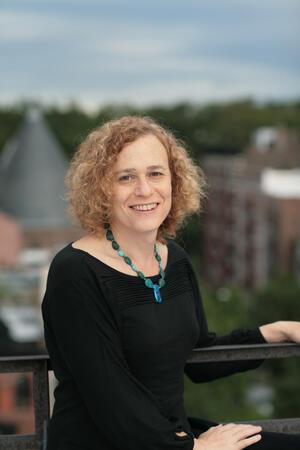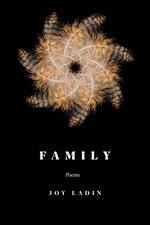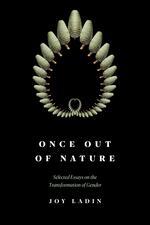Q & A with Poet Joy Ladin
JWA chats with poet and activist Joy Ladin about her two new books, gender transformations, and resisting tyranny.
JWA: Your new book Family contains poems about moving and adapting to illness. Do you ever feel that your poetry is teaching you, guiding you?
Joy Ladin: Being housebound by illness is my most recent transformation, and writing poetry has indeed been helping me learn how to live with it. But poetry has been teaching me as long as I’ve been working seriously on poems. My rough drafts are self-delighting, judgment-free zones. But revising, which makes up most of my work on poetry, demands that I consider every choice I make in a poem, and as I do, poetry teaches me not just about craft but about the nature of language, about the many shades of truth and falsehood, about the loss and wonder that accompany the incarnation of infinite possibility into form, voice, and presence.
Revising poems is a form of existential homework, challenging me to learn what meaning and beauty are and when I have achieved them; where to end and when to keep going, when to let go and when to commit myself to realizing a poem no matter how many years it takes; what my limits are and how to push beyond them; who I include when I say “you,” who I mean when I say “I,” and how to turn myself and my poems over to what is beyond my understanding.
But sometimes poetry teaches me more directly. Writing The Book of Anna gave me daily experience of someone stronger, more honest, more courageous, more utterly true to herself than I, after decades in the closet, had been able to imagine. When I was in the first, internal phase of transition, a voice started speaking to me through many of the poems I was writing—a voice from the future that kept demanding I become myself and assuring me I would survive the terrors that had kept me frozen behind the mask of masculinity. Psalms taught me that divinity is neither simply there nor simply beyond, that relating to God in ways that included all of both of us was a dynamic, complicated, often difficult and never-completed process that demanded courage, compassion, ruthless honesty, nimbleness, snarkiness, and creativity. Those teachings blossomed, years later, into Shekhinah Speaks, poems through which I heard divinity speaking, intimately and authoritatively, to a human you that includes all of us—which meant, I knew, the Shekhinah was speaking to me, teaching me that I, like everyone else, grow out of, express, and am a dwelling place for divinity.
JWA: You write so movingly in Family about your mother’s descent into death. What did her dying teach you?
JL: For me, the greatest lesson I learned as my mother was dying was that, though we never knew one another well, we really loved each other—and that as her life was shutting down, that love was what mattered. But she also taught me other things while she was dying, through her courageous cheerfulness (one of her favorite comments was “No one can say I died young”), her matter-of-fact acceptance of disability and death without fear, self-pity, or despair. She felt she had had a good life, and she taught me that we can see the goodness of our lives even when our lives are ending and much of what we loved about living is behind us.
My mother also taught me—and unlike the other lessons, I felt she was trying consciously to teach me—that she, I, and everyone else were doing the best we could, and that no matter what, we can always do the best we can, and in this way triumph over our limitations and circumstances. Affirming that she was doing the best she could enabled her to accept her growing dependence on others, something that was very hard for someone who had been so fiercely independent. To her very last breath, my mother did the best she could, and she showed me that I could do that too. Our lives, bodies, and the world may change in terrifying ways, but we can always do the best we can.
JWA: You have lived between genders. How would you describe your transformations?
JL: There is so much wisdom in the plural of your question! Like everyone, I’ve been transforming all my life, growing into and out of different versions of myself, different identities, roles and ways of life.
In terms of gender, I have experienced several major transformations. The first was transformation from infant obliviousness into a child conscious that others saw me as a boy when I experienced myself as female, and that neither they nor the culture that surrounded me could recognize, understand, or accept who I knew myself to be. Terror of the rejection and violence I expected if I lived my true self led to more than 40 years of hiding in the closet of masculinity, despite how miserable that made me.
My next transformation began with my realization that no matter how scared I was, I couldn’t live as a man anymore. That was the beginning of years of gender transition, dismantling my male persona and learning to live as who I really am. I fought to free myself from fear and internalized transphobia and began what they call social transition. I came out to friends as trans, even though I was still living as a man, and for a while, I commuted between presenting as male and presenting as female, which for me felt like commuting between life and death.
Eventually, I overcame my fear and started to live full-time as a woman, and (a different kind of transformation) as someone who is openly transgender. I lost my marriage and home and entered a stretch of housing and economic insecurity. It was the most intense time I’ve ever gone through, exhilarating and heart-breaking at the same time.
This personal transformation led to a professional transformation, as, for the first time, I wrote about trans identity, publishing my memoir of transition, Through the Door of Life ( a National Jewish Book Award finalist), a collection of poetry focused on trans experience, Transmigration (my first book under a name I identified with), and many essays. Along with writing about trans identity, I became a nationally recognized public speaker. Hard as my new life felt, I was blossoming.
That blossoming led to another transformation when, toward the end of that period, at a retreat at which I’d been invited to speak, I met and immediately fell in fortunately-reciprocated love with the woman I have since married. She enabled me to stabilize my life, stop scrambling for a place to sleep, and, for the first time, feel part of a family in which I was known and loved for who I am.
As my life stabilized, I realized that my relation to gender was changing. I still identified as female, but I wanted to live my identification in a way that didn’t unilaterally demand that others alter what “female” and “woman” means to them—to live as the woman I knew myself to be, without fighting about what essence my female gender identification represents. It saddened me to accept that I will never fit traditional binary definitions of “female” and “woman,” but that also empowered me to embrace my whole self, including the parts, such as my life as a man, that I previously felt threatened my identification as female. This enlarged my understanding of not only gender identity, but of all identities. It taught me that no matter how well we may fit the categories and roles with which we are identified, no matter how central they are to how we live and understand ourselves, all human beings, trans or not, are always more than identities say we are. From this perspective, I could finally see that despite how different my trans identity had always made me feel, I was, and had always been, a full-fledged member of the human family.
JWA: What sustains you in these dark times?
JL: Because I am housebound by illness, I’m trying to practice cognitive resistance, to learn to manage panic before I have to face the realization of at least some of what I fear. To me that requires noticing what is good right now, and reminding myself that the world is full of things— sunrise, music, poetry, the sounds of playing children—that will remain good no matter what happens.
For me, resistance also means feeling the presence of the divinity that laughs at repressive regimes and their pretense of power and omnipresence—and when I am too panicked to feel divinity, resistance means recognizing my feeling of being alone as an eclipse of my own creation, that, as the Baal Shem Tov said, “The universe is full of enormous lights and wonders, and each of us can block them out with one small hand.”
The Baal Shem Tov wanted his followers, who included those long impoverished by institutionalized oppression and antisemitism, to remember and exercise their internal agency, beyond the reach of czars and Cossacks, the choices we always have about what we pay attention to. Authoritarians want us to feel we have no agency, to keep us distracted, afraid, and despairing, because our agency terrifies them. They know that if we remember our agency, our minds and hearts remain independent states, beyond even their most intrusive reach.
Claiming our agency means there is always hope, because we can always hope, by which I mean we can always remember that no matter how successful authoritarians may be in institutionalizing despair, despair represents a tiny, transient sliver of reality, and we are all umbilically connected to a vast, enduring creation—and to what Judaism calls God. For me, resistance requires rooting myself in what is beyond and before me, and the generations who will come after, remembering that, as Isaiah says, “nations are a drop in a bucket,” that we each are local embodiments of power that cannot be constrained, of a future that cannot be determined.
JWA: What new projects are you embarking on?
JL: I have recently become cautiously optimistic that a new book of poetry is growing—I have a tentative title, and an accumulation of poems, though how many will fit together and be good enough to be part of a book won’t be clear for a while. I’m entering my final month of virtual book tour events for Family and Once Out of Nature: Selected Essays on the Transformation of Gender, which came out at the same time. I haven’t figured out how the election will affect my sense of the work I have to do going forward, but I know that it will include prose as well as poetry and teaching as well as speaking. Part of the work is theological, developing ideas about the Shekhinah that can offer other ways of claiming their powers to imagine and relate to what is beyond us. Part is a continuation, in more focused form, of the striving in Once Out of Nature for more productive, less reductive, and more constructive ways of thinking and talking about gender; in particular, I have been working toward a common denominator language of gender, a language everyone can use to talk through conflicts between different ways of doing gender that enables us to understand others’ ways without betraying our own.
Though I don’t know yet what will come of it, as you can see in my answer to your [previous] question, I am also thinking about what Judaism and Jewish tradition can teach us about surviving tyranny – a subject that suddenly feels urgent to me. After the Roman destruction, the ancient rabbis reimagined Judaism as, among other things, a storehouse of ways that individuals and communities survive tyranny and persecution. The sometimes exalted, sometimes neurotic laws and rules that we call halachah are designed to remind us that no matter what happens in the world around us, each of our lives, even our tiniest actions, matter: how we speak to one another, wash our hands, eat and drink, conduct our business affairs, wake up and go to sleep. Halachah demands that we pay attention to every aspect of our lives, because, contrary to what authoritarians want to make us believe, every action, every moment, and every human being matters.
The practice of living our lives and treating others as though they always matter enabled Jews to survive millennia of being marginalized, despised, and singled out for discrimination and persecution. Whether or not we are, like migrants and LGBTQ+ people, in the direct line of fire, we know that authoritarians will be working hard to make us feel that we don’t matter. Judaism teaches us that they are wrong, and that every moment offers an opportunity for resistance, because every moment, we can choose to do things consciously, gratefully, generously, kindly, in ways that affirm that we and those around us matter.









